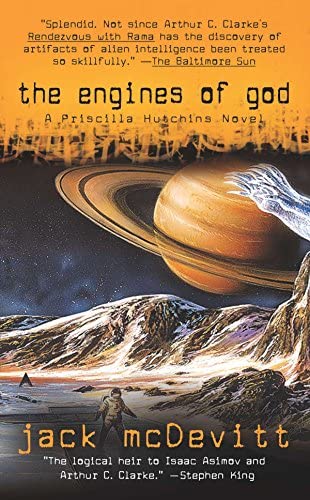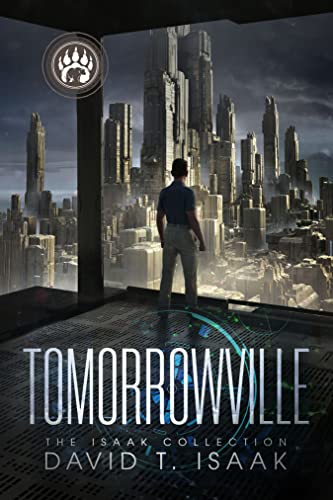
He is credited with at least twenty-six science fiction novels and seven collections of short stories. And Stephen King reportedly called him “the logical heir to Isaac Asimov and Arthur C. Clarke.” So, I have to believe that The Engines of God is an outlier in Jack McDevitt’s writing career. Because, despite an intriguing premise, this deeply flawed novel about the discovery of alien artifacts is difficult to follow and unsatisfying in the end.
Estimated reading time: 5 minutes
Intelligent life is rare in McDevitt’s universe
McDevitt grounds his story in the assumption that intelligent life is exceedingly rare in the galaxy. Humanity has discovered only one other sentient extraterrestrial life form. But the Noks of the planet Inakadedemeri are backward by Earth standards. The decision has been made not to make contact with them. And elsewhere all that remains on planets scattered throughout our galactic neighborhood are ruins of civilizations that may once have been great—and monuments that appear to be works of art. But a mystery enshrouds the discoveries. Because many of those ruins appear to have been charred by some outside force—perhaps the powerful race archaeologists call the Monument-Makers. Explorers had first stumbled across their work two hundred years ago. But the only trace of the builders’ existence are the alien artifacts they’ve left behind.
The Engines of God (The Academy #1 of 8) by Jack McDevitt (1994) 432 pages ★★★☆☆

Here’s what’s wrong with this novel
Interstellar pilot Priscilla Hutchins is the protagonist of McDevitt’s story. But more often than not, she is more an observer than an actor in her own right. Others—mostly, a team of fifteen archaeologists she ferries around—act out the central elements in the tale. Of course, from time to time, “Hutch” saves their lives. But they do the real work, and too little of it involves action. The story is dominated by the relationships among the archaeologists and their conflicting views about the origins of the artifacts they find. Little of this makes for compelling reading. Beyond that problem, three others stand out:
Too many characters
There are far too many characters with names, including some who are never heard from more than once. This makes it very difficult to follow the story. With the sole exception of Hutch, the pilot, few of the characters seem memorable until the concluding chapters. By that point, the sheer repetition of their names has made them stand out. But for the most part they’re two-dimensional, more like talking heads than real people.
Aliens are unlikely to resemble humans
McDevitt seems to assume that extraterrestrials will look and act like human beings. They’ll walk on two legs, build with two hands, communicate by spoken and written language, and possess the same five senses. Which is extremely unlikely, even preposterous. Oh, they may look a little different, with furry bodies and alligator-like snouts. But they build cities, sail the oceans, farm the land, and wage war among themselves with weapons resembling ours. Sure! Tell me another one.
An ethnocentric perspective
All the characters in The Engines of God, with only one exception, are American and have simple, Anglo-Saxon names. (The exception is a woman of Pacific-Islander heritage whose surname is Tufu. Oh, and there’s another one in the background, said to be African.) But most of those peopling the novel are archaeologists—a field characterized even today by extraordinary breadth and diversity. Here, for example, are the first ten names on Wikipedia’s list of archaeologists:
- Kamyar Abdi
- Aziz Ab’Saber
- Johann Michael Akner
- Dinu Adameșteanu
- James M. Adovasio
- Anagnostis Agelarakis
- Yohanan Aharoni
- Edward R. Ayrton
- Ekrem Akurgal
- Jorge de Alarcão
Anyone with even a passing familiarity with the field of archaeology knows that this list is far from unusual. No group of archaeologists as large as that in McDevitt’s novel could fail to reflect ethnic diversity like that on this list. Not in the twenty-third century. And not even in the twenty-first.
About the author

Jack McDevitt is the author of at least twenty-six science fiction novels and seven collections of short stories. An American, he was born in 1935. Most of his work involves attempts by humanity to contact alien races. Many of his novels have been nominated for Hugo or Nebula Awards but only one received the Nebula, in 2006. McDevitt holds a BA from La Salle University and a master’s degree in literature from Wesleyan University. He now lives near Brunswick, Georgia.
For related reading
The late, great Arthur C. Clarke wrote a far more satisfying novel about alien artifacts: Rendezvous With Rama (Arthur C. Clarke’s believable First Contact novel).
Check out:
- These novels won both Hugo and Nebula Awards
- The ultimate guide to the all-time best science fiction novels
- 10 top science fiction novels
- The top 10 dystopian novels
- Eight new science fiction authors worth reading now
And you can always find my most popular reviews, and the most recent ones, on the Home Page.


























